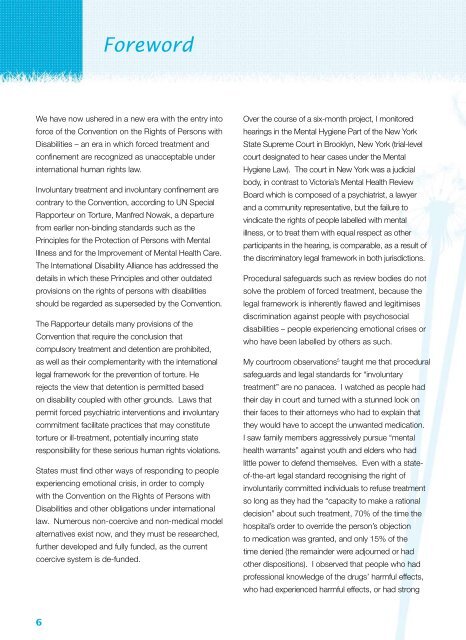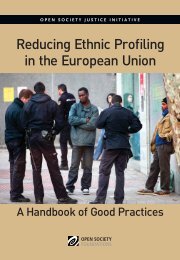Lacking Insight - Community Law
Lacking Insight - Community Law
Lacking Insight - Community Law
- No tags were found...
Create successful ePaper yourself
Turn your PDF publications into a flip-book with our unique Google optimized e-Paper software.
ForewordWe have now ushered in a new era with the entry intoforce of the Convention on the Rights of Persons withDisabilities – an era in which forced treatment andconfinement are recognized as unacceptable underinternational human rights law.Involuntary treatment and involuntary confinement arecontrary to the Convention, according to UN SpecialRapporteur on Torture, Manfred Nowak, a departurefrom earlier non-binding standards such as thePrinciples for the Protection of Persons with MentalIllness and for the Improvement of Mental Health Care.The International Disability Alliance has addressed thedetails in which these Principles and other outdatedprovisions on the rights of persons with disabilitiesshould be regarded as superseded by the Convention.The Rapporteur details many provisions of theConvention that require the conclusion thatcompulsory treatment and detention are prohibited,as well as their complementarity with the internationallegal framework for the prevention of torture. Herejects the view that detention is permitted basedon disability coupled with other grounds. <strong>Law</strong>s thatpermit forced psychiatric interventions and involuntarycommitment facilitate practices that may constitutetorture or ill-treatment, potentially incurring stateresponsibility for these serious human rights violations.States must find other ways of responding to peopleexperiencing emotional crisis, in order to complywith the Convention on the Rights of Persons withDisabilities and other obligations under internationallaw. Numerous non-coercive and non-medical modelalternatives exist now, and they must be researched,further developed and fully funded, as the currentcoercive system is de-funded.Over the course of a six-month project, I monitoredhearings in the Mental Hygiene Part of the New YorkState Supreme Court in Brooklyn, New York (trial-levelcourt designated to hear cases under the MentalHygiene <strong>Law</strong>). The court in New York was a judicialbody, in contrast to Victoria’s Mental Health ReviewBoard which is composed of a psychiatrist, a lawyerand a community representative, but the failure tovindicate the rights of people labelled with mentalillness, or to treat them with equal respect as otherparticipants in the hearing, is comparable, as a result ofthe discriminatory legal framework in both jurisdictions.Procedural safeguards such as review bodies do notsolve the problem of forced treatment, because thelegal framework is inherently flawed and legitimisesdiscrimination against people with psychosocialdisabilities – people experiencing emotional crises orwho have been labelled by others as such.My courtroom observations 5 taught me that proceduralsafeguards and legal standards for “involuntarytreatment” are no panacea. I watched as people hadtheir day in court and turned with a stunned look ontheir faces to their attorneys who had to explain thatthey would have to accept the unwanted medication.I saw family members aggressively pursue “mentalhealth warrants” against youth and elders who hadlittle power to defend themselves. Even with a stateof-the-artlegal standard recognising the right ofinvoluntarily committed individuals to refuse treatmentso long as they had the “capacity to make a rationaldecision” about such treatment, 70% of the time thehospital’s order to override the person’s objectionto medication was granted, and only 15% of thetime denied (the remainder were adjourned or hadother dispositions). I observed that people who hadprofessional knowledge of the drugs’ harmful effects,who had experienced harmful effects, or had strong6
















